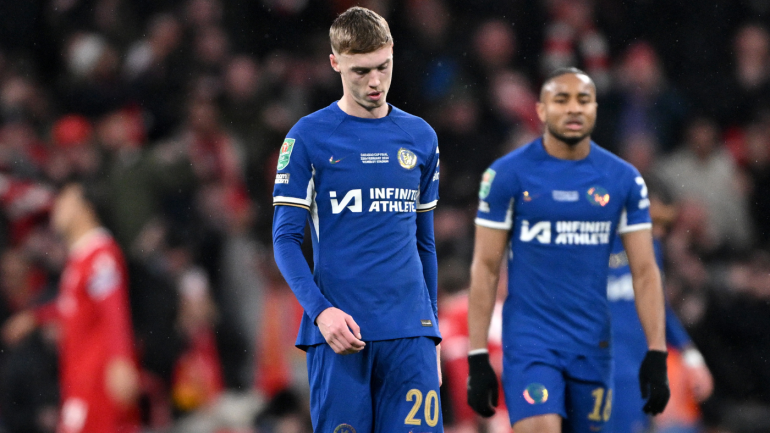Why Chelsea Must Stick with Their Squad Despite Recent Struggles
The sting of Gary Neville’s “blue, billion-pound bottle jobs” remark will linger for a while among Chelsea’s players. However, regardless of fan sentiments, they are here to stay at Stamford Bridge. Another season without European football looms, and Mauricio Pochettino’s squad must rely on the same players who led them into this predicament to get them out.

Struggles
When confronted with Neville’s criticism, Pochettino emphasized an overlooked aspect amidst Liverpool’s EFL Cup celebrations: the age factor. He pointed out that Chelsea’s squad, with an average age of just under 24, was comparable to Liverpool’s, despite the youthful exuberance displayed by the latter. Even in extra time, Chelsea’s side was notably younger, hovering around 22.5 years old. In light of these figures, it’s reasonable to suggest that youth may have contributed to their performance under pressure.
However, Pochettino’s defense overlooks a crucial point: the level of experience. While Liverpool’s young players had limited senior football exposure, Chelsea’s starters, albeit slightly older, possess significant top-level experience. Hence, higher expectations are justified for them in high-pressure situations. Nevertheless, amidst the few disappointments, there are bright spots, such as Malo Gusto’s commendable performance.
Optimistically, Chelsea’s youngsters may learn from these experiences and mature into a formidable force capable of challenging seasoned opponents like Virgil van Dijk. Yet, the reality is harsh. The squad is tied down by lengthy contracts extending well into the 2030s. Although these contracts allowed the club to front-load expenditures, the underwhelming performances of certain players, like Mykhailo Mudryk, raise concerns.
With significant financial commitments, Chelsea faces challenges in offloading underperforming players. Unlike the successful sales of the 2021 Champions League-winning squad members, finding suitors for the current crop may prove difficult. The inflated book values of these players further complicate matters.
While there are potential assets to sell, such as Conor Gallagher or Ian Maatsen, shedding contracts alone may not suffice. Extending contracts to spread fees over time risks financial strain akin to Barry Bonilla’s situation. Increasing revenue streams offers a viable solution but requires time.
In essence, Chelsea’s current squad, albeit promising, faces uncertainties. While there’s hope for improvement, the road ahead appears daunting. Nevertheless, the club is bound to this path for the foreseeable future, necessitating patience and resilience from both players and fans alike.
